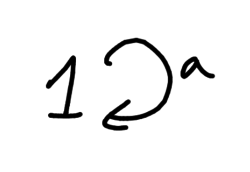Difference between revisions of "M(3,1,1)"
(Pic_k) |
|||
| (3 intermediate revisions by the same user not shown) | |||
| Line 3: | Line 3: | ||
{{blockbox | {{blockbox | ||
|title = M(3,1,1) - <math>kC_3</math> | |title = M(3,1,1) - <math>kC_3</math> | ||
| − | |image = | + | |image = M(2,1,1)quiver.png |
|representative = <math>kC_3</math> | |representative = <math>kC_3</math> | ||
|defect = [[C3|<math>C_3</math>]] | |defect = [[C3|<math>C_3</math>]] | ||
| Line 29: | Line 29: | ||
|k-derived = [[M(3,1,2)]] | |k-derived = [[M(3,1,2)]] | ||
|O-derived-known? = Yes | |O-derived-known? = Yes | ||
| − | |Pic-k= | + | |Pic-k=<math>k:k^*</math> |
| + | |coveringblocks=[[M(3,1,2)]] | ||
| + | |coveredblocks= | ||
}} | }} | ||
| Line 48: | Line 50: | ||
If <math>B</math> lies in M(3,1,1), then <math>b</math> must lie in M(3,1,1) or M(3,1,2). <span style="color: red">Example needed.</span> | If <math>B</math> lies in M(3,1,1), then <math>b</math> must lie in M(3,1,1) or M(3,1,2). <span style="color: red">Example needed.</span> | ||
| + | |||
| + | [[C3|Back to <math>C_3</math>]] | ||
| + | |||
| + | [[Category: Morita equivalence classes|3,1,1]] | ||
| + | [[Category: Blocks with defect group C3]] | ||
| + | [[Category: Blocks with cyclic defect group|3,1]] | ||
| + | [[Category: Nilpotent blocks|3,1,1]] | ||
Latest revision as of 14:59, 7 October 2018
M(3,1,1) - [math]kC_3[/math]
| Representative: | [math]kC_3[/math] |
|---|---|
| Defect groups: | [math]C_3[/math] |
| Inertial quotients: | [math]1[/math] |
| [math]k(B)=[/math] | 3 |
| [math]l(B)=[/math] | 1 |
| [math]{\rm mf}_k(B)=[/math] | 1 |
| [math]{\rm Pic}_k(B)=[/math] | [math]k:k^*[/math] |
| Cartan matrix: | [math]\left( \begin{array}{c} 3 \\ \end{array} \right)[/math] |
| Defect group Morita invariant? | Yes |
| Inertial quotient Morita invariant? | Yes |
| [math]\mathcal{O}[/math]-Morita classes known? | Yes |
| [math]\mathcal{O}[/math]-Morita classes: | [math]\mathcal{O} C_3[/math] |
| Decomposition matrices: | [math]\left( \begin{array}{c} 1 \\ 1 \\ 1 \\ \end{array}\right)[/math] |
| [math]{\rm mf}_\mathcal{O}(B)=[/math] | 1 |
| [math]{\rm Pic}_{\mathcal{O}}(B)=[/math] | [math]\mathcal{L}(B)=S_3[/math] |
| [math]PI(B)=[/math] | {{{PIgroup}}} |
| Source algebras known? | Yes |
| Source algebra reps: | [math]kC_3[/math] |
| [math]k[/math]-derived equiv. classes known? | Yes |
| [math]k[/math]-derived equivalent to: | M(3,1,2) |
| [math]\mathcal{O}[/math]-derived equiv. classes known? | Yes |
| [math]p'[/math]-index covering blocks: | M(3,1,2) |
| [math]p'[/math]-index covered blocks: | |
| Index [math]p[/math] covering blocks: | {{{pcoveringblocks}}} |
Basic algebra
Quiver: a : <1,1>
Relations w.r.t. [math]k[/math]: a^3=0
Other notatable representatives
Covering blocks and covered blocks
Let [math]N \triangleleft G[/math] with [math]p'[/math]-index and let [math]B[/math] be a block of [math]\mathcal{O} G[/math] covering a block [math]b[/math] of [math]\mathcal{O} N[/math].
If [math]b[/math] lies in M(3,1,1), then [math]B[/math] must lie in M(3,1,1) or M(3,1,2). For example consider the principal blocks of [math]C_3 \triangleleft S_3[/math].
If [math]B[/math] lies in M(3,1,1), then [math]b[/math] must lie in M(3,1,1) or M(3,1,2). Example needed.
